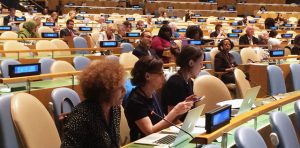
Sandra Mullin, Senior VP of Policy, Advocacy and Communication, was invited to speak at a civil society hearing at the United Nations on May 26, on the post-2015 Sustainable Development Goals, it’s targets and indicators. Vital Strategies spoke on behalf of the Non-Communicable Disease Alliance and called for attention to non-communicable diseases and its most important cause – tobacco use.
Here is a transcript of the speech:
Good Afternoon excellences, ladies and gentlemen. My name is Sandra Mullin, Senior VP of Policy, Advocacy and Communication at Vital Strategies. I am honored to be in this august room representing the NCD Alliance, a coalition of more than 2,000 organizations from 170 countries dedicated to making sure non-communicable diseases, health and well-being are indelibly included in all elements of the post 2015 agenda.
But first, I want to tell you a story about a very brave young woman and how she was affected by a non-communicable disease.
Her name is Sunita Tomar. Sunita was married quite young to a truck driver, a “good man,” as she described him, and together they had two lovely children.
Like many other women and girls especially in rural parts of India, Sunita chewed mishri, a tobacco leaf marketed as a breath freshener.
Sunita didn’t know, and so many tobacco chewers do not know, that mishri can cause oral cancer. Sunita’s diagnosis came at age 27. A growing tumor had to be removed along with part of her mouth.
Sunita knew her life was at risk, and feared for the future of her sons, ages 12 and 13. Even successful surgery would leave her face permanently disfigured and in her small village in Madhya Pradesh, she was likely to be stigmatized.
Nevertheless, Sunita participated in a public awareness campaign, believing that her story could help tell the truth about tobacco and save young people from the suffering she experienced.
While she survived the surgery, it was still too late to save her life. Sunita died last month.
This is the face of NCDs, the face behind the SDGs, targets, and indicators. The real people behind all this talk.
Sunita’s story highlights why we need urgent action to stop lung diseases, cancers, heart disease and diabetes that are 100 percent preventable. It is why health has to be recognized as a prerequisite, outcome, and indicator of sustainable human development.
As the panelists have made clear, both this morning and this afternoon, poverty and inequality, social determinants of health undergird misery and immobility in our globe, and are inextricably linked to illness and disability. Health care costs, lost productivity, lack of access to care are among the economic consequences.
As such, we call on Member States to:
• Ensure strong references to health for all at all ages, including mental health and wellbeing in all parts of the post-2015 agenda, including the declaration.
• Take action on SDG 3 beyond the health sector at the global and national levels. Non-communicable diseases and tobacco control must be part of both health and overall development planning. The NCD Alliance is already working with 32 national and regional alliances to ensure civil society and is ready to support Member States’ efforts.
• Make strong, specific commitments at the Third International Conference on Financing for Development to increase the human and financial resources allocated to health to strengthen health systems.
• Finally, tobacco use is the leading preventable epidemic of our time. Its use is highest among the poor. 80% of daily users are in low and middle income countries. Money spent on tobacco is not available for basic necessities such as food, clothes, education and healthcare. For those who live in poverty, even a small diversion of resources has an impact of health and nutrition.
• As part of efforts to strengthen implementation of the Framework Convention on Tobacco Control, it is critical that nations step up to increase tobacco taxes. This is the most direct and effective strategy to reduce tobacco use and can provide sustainable domestic funding for tobacco control, NCD prevention and treatment, as well as universal health coverage.
Together, these efforts will prevent needless tragedy like Sunita’s, and move us all toward a sustainable, equitable, healthier future.
Thank you.